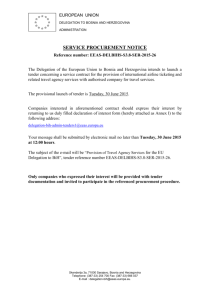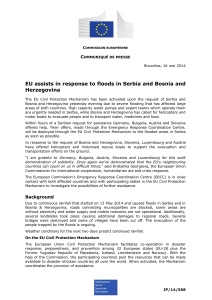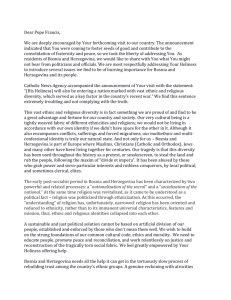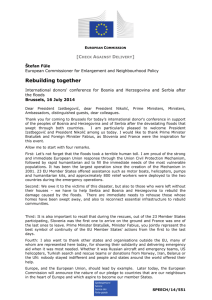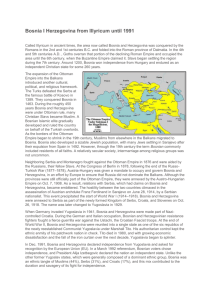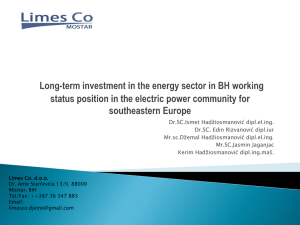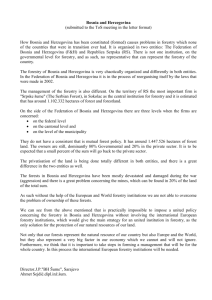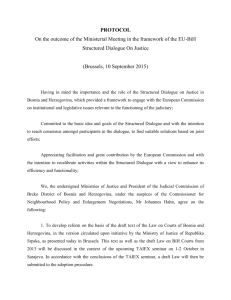Managing Globalization through Free Trade Areas
advertisement
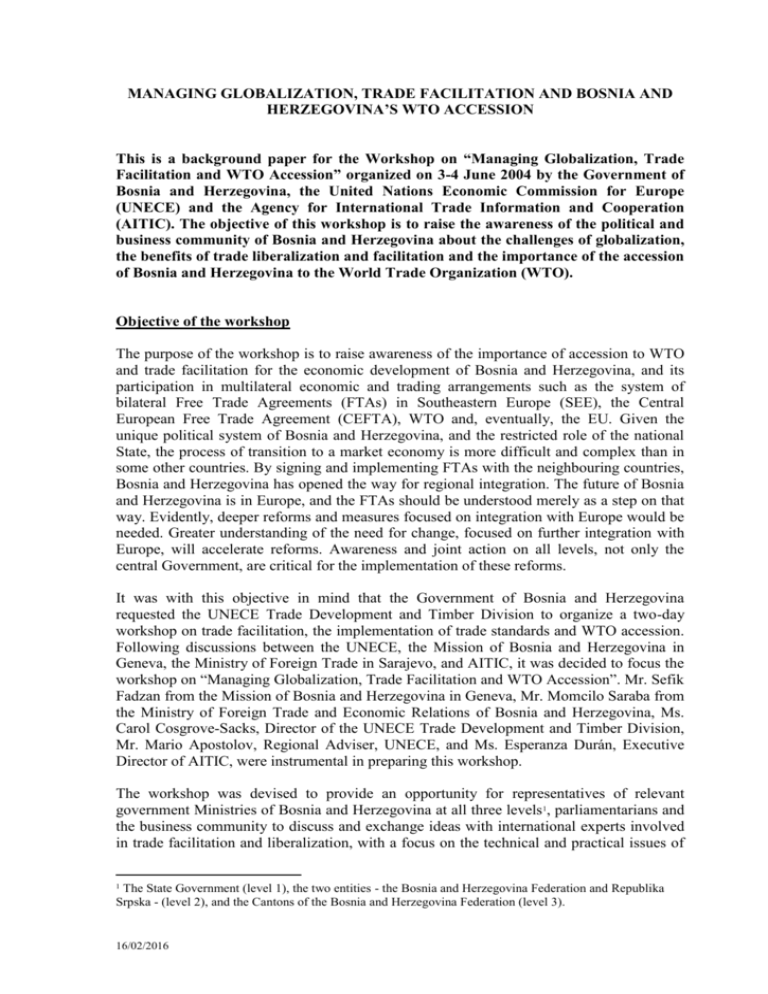
MANAGING GLOBALIZATION, TRADE FACILITATION AND BOSNIA AND HERZEGOVINA’S WTO ACCESSION This is a background paper for the Workshop on “Managing Globalization, Trade Facilitation and WTO Accession” organized on 3-4 June 2004 by the Government of Bosnia and Herzegovina, the United Nations Economic Commission for Europe (UNECE) and the Agency for International Trade Information and Cooperation (AITIC). The objective of this workshop is to raise the awareness of the political and business community of Bosnia and Herzegovina about the challenges of globalization, the benefits of trade liberalization and facilitation and the importance of the accession of Bosnia and Herzegovina to the World Trade Organization (WTO). Objective of the workshop The purpose of the workshop is to raise awareness of the importance of accession to WTO and trade facilitation for the economic development of Bosnia and Herzegovina, and its participation in multilateral economic and trading arrangements such as the system of bilateral Free Trade Agreements (FTAs) in Southeastern Europe (SEE), the Central European Free Trade Agreement (CEFTA), WTO and, eventually, the EU. Given the unique political system of Bosnia and Herzegovina, and the restricted role of the national State, the process of transition to a market economy is more difficult and complex than in some other countries. By signing and implementing FTAs with the neighbouring countries, Bosnia and Herzegovina has opened the way for regional integration. The future of Bosnia and Herzegovina is in Europe, and the FTAs should be understood merely as a step on that way. Evidently, deeper reforms and measures focused on integration with Europe would be needed. Greater understanding of the need for change, focused on further integration with Europe, will accelerate reforms. Awareness and joint action on all levels, not only the central Government, are critical for the implementation of these reforms. It was with this objective in mind that the Government of Bosnia and Herzegovina requested the UNECE Trade Development and Timber Division to organize a two-day workshop on trade facilitation, the implementation of trade standards and WTO accession. Following discussions between the UNECE, the Mission of Bosnia and Herzegovina in Geneva, the Ministry of Foreign Trade in Sarajevo, and AITIC, it was decided to focus the workshop on “Managing Globalization, Trade Facilitation and WTO Accession”. Mr. Sefik Fadzan from the Mission of Bosnia and Herzegovina in Geneva, Mr. Momcilo Saraba from the Ministry of Foreign Trade and Economic Relations of Bosnia and Herzegovina, Ms. Carol Cosgrove-Sacks, Director of the UNECE Trade Development and Timber Division, Mr. Mario Apostolov, Regional Adviser, UNECE, and Ms. Esperanza Durán, Executive Director of AITIC, were instrumental in preparing this workshop. The workshop was devised to provide an opportunity for representatives of relevant government Ministries of Bosnia and Herzegovina at all three levels1, parliamentarians and the business community to discuss and exchange ideas with international experts involved in trade facilitation and liberalization, with a focus on the technical and practical issues of 1 The State Government (level 1), the two entities - the Bosnia and Herzegovina Federation and Republika Srpska - (level 2), and the Cantons of the Bosnia and Herzegovina Federation (level 3). 16/02/2016 2 Bosnia and Herzegovina’s process of accession to the WTO and regional cooperation in Southeastern Europe (SEE). The Workshop is scheduled for one and a half days. The target audience is Members of Parliament, representatives of State institutions in the economic field, businesspersons, and the international community in Bosnia and Herzegovina. The Government requested UNECE to help organize this workshop with a view to explaining better to its major stakeholders – namely Members of Parliament and the business community - the benefits of accession to the WTO. It is important that Bosnian society understands that these benefits go beyond concerns with procedural matters of the multilateral trade negotiations, especially in the light of the problems encountered at the WTO Ministerial Meeting in Cancún; concerns about some negative effects of liberalization and the difficulties, which some sectors of the Bosnian economy are facing. The workshop aims at highlighting more important issues which are at stake in the accession to the WTO, such as integration into the world economy in general and with Europe in particular, as well as the implications for overall economic policy-making. Bosnia and Herzegovina - Basic Features Bosnia and Herzegovina, one of the successor States of the former Socialist Federal Republic of Yugoslavia (SFRY), has met numerous challenges in its double transition from a planned to a market economy and from war to peace. Its political system today comprises two entities, the Federation and the other centralized – Republika Srpska and Brcko District. The Constitution of Bosnia and Herzegovina, in the same way as Annex 4 of the Dayton Peace Agreement of 1995, which put an end to over three years of war, attributes limited competencies to the National State Government. This has been a major constraint for the overarching State, which paralyzed the ability to assert the authority of the central State and to develop and pursue a consistent policy agenda. The involvement of the international community and of the High Representative has been essential in developing the State institutions of unified Bosnia and Herzegovina, and in providing guidelines for a strategy for development. The National Economic Development Strategy (EDS) for the period 2000-2004, whose principal objective is sustainable economic growth, poverty alleviation, and curbing unemployment, was produced as a result of the collaborative effort of the National State and the two constitutive entities. The EDS served as the basis for preparing a second draft of the Poverty Reduction Strategy Paper (PRSP). This paper showed the rising awareness of State officials about their role as decision-makers upon priorities and much needed reforms. The international community has been very helpful in this process, as it wants to see a unified national State capable of managing its own affairs and being a reliable partner for the EU and other members of the international community. Bosnia and Herzegovina has achieved remarkable progress in some areas. The Currency Board Arrangement and the establishment of the Central Bank of Bosnia and Herzegovina (CBBH) in 1997 introduced a common currency in the whole country, the “Konvertibilna Marka” (KM, Convertible Mark), which is pegged to the Euro. The resulting low inflation earned the domestic currency a measure of credibility. Savings have risen with the stabilization of the banking sector. Successful reforms in the banking, customs and taxation systems have been carried out. In 2004 Bosnia and Herzegovina already has a unified customs system – a function performed by the Indirect Taxation Authority (ITA) of the State of Bosnia and 3 Herzegovina. The objective is to merge customs administrations of the two constitutive entities and Brcko District; develop and implement a single State-wide Value Added Tax (VAT) system, which will be realized through the ITA; modernize and professionalize the way indirect taxes are administered; contribute to the overall macroeconomic stability and fiscal sustainability of Bosnia and Herzegovina and support the functioning of a Single Economic Space in the State. ITA has five main functions: taxation (VAT and excise); customs service; law enforcement; business services (internal administration); IT development. Its headquarters are in Banja Luka and branch offices in Mostar, Sarajevo and Tuzla, based on the principles of economic efficiency. A State-level VAT is planned to replace the current entity level sales tax in the beginning of 2006. This will create a system with a single VAT rate; single administration of VAT, as a part of the ITA; single VAT accounting, and fixed tax rates and tax base and exemptions according to the Sixth Directive on VAT. The key benefits of this unification of the customs and taxation services of the two entities are: more effective budget revenue collection; better control of goods; single information system, and therefore faster exchange of information; acceleration of transit procedures due to the elimination of controls between the entities; acceleration of internal and foreign trade flows. Figure 1: Distribution of responsibilities between the State and constitutive entities. 2003 2004 2006 Entities State Entities State Entities State Customs Sales taxes Customs Sales taxes Excise -domestic Excise – import Excise duties Direct taxes VAT Direct taxes development Source: Indirect Taxation Authority of Bosnia and Herzegovina Direct taxes Customs Excise duties VAT The Law on the Foreign Trade Chamber of Bosnia and Herzegovina (passed on 18 December 2001) made another step in the unification of the country after the war of 19921995. The Foreign Trade Chamber provides services to business from both entities, contributing to the establishment of a common economic space in Bosnia and Herzegovina. The unification of the systems providing the basis for customs, taxation and business activity are important not only for the political stabilization of Bosnia and Herzegovina, but also for the normal functioning of its economy and for economic growth. One of the problems resulting from the double transition in Bosnia and Herzegovina is the heavy unemployment rate: 41,1% as a whole for Bosnia and Herzegovina; 42.7% for the Federation; and 38.2% for Republika Srpska (Dec. 2002).2 If the positive tendencies of low inflation (0.6% in consumer prices) and steady economic growth (GDP grew from 4,399m EUR in 1999 to 4,914m EUR in 2000, 5,358m EUR in 2001, and 5,957m EUR in 2002) are maintained, unemployment will also go down.3 Trade Liberalization Bosnia and Herzegovina considers integration into regional, European and global markets, as well as membership in the WTO, a high priority. In 2001 it signed, together with the other countries of Southeastern Europe, the Memorandum of Understanding (MoU) on 2 3 Source: Foreign Trade Chamber of Bosnia and Herzegovina. ibid. 4 Trade Facilitation and Liberalization developed through the Stability Pact for South-eastern Europe4. This MoU became the foundation for serious cuts in tariffs, mostly on the basis of bilateral Free Trade Agreements (FTAs) and overall liberalization of trade among the signatories. The Stability Pact fostered the establishment of a network of 30 bilateral FTAs, which provide for the liberalization of at least 90% of mutual trade, notably in terms of tariff cuts. Preferential rules of origin are applied, and regulations will be harmonized with EU legislation. Provisions concerning trade in services are not yet under negotiation. When fully implemented these arrangements are expected to boost intra-regional trade, enhance efficiency, increase competition and enable economies of scale, thus hopefully attracting more FDI. The SEE Ministerial Meeting on 13 November 2003 reconfirmed the intention to harmonize the Free Trade Agreements, thus creating a “virtual” free trade area encompassing seven countries with 55 million inhabitants. Certain concerns in Bosnian society have led to freezing two of the FTAs for several months in 2004, but the overall understanding of the usefulness of liberalization has helped continue the process. It is important to note that all efforts aimed at regional trade liberalization, be it the Stability Pact-driven system of FTAs or the idea that the SEE countries make a harder effort to join the member-driven Central European Free Trade Area (CEFTA), are focused on European integration and on eventual accession to the European Union. Three of the SEE countries - Bulgaria, Croatia, and Romania - are members of CEFTA5, which goes deeper in the process of trade liberalization than the FTAs. Based on the model and practices of the European Free Trade Association (EFTA), CEFTA was successfully used by its original members (the Czech Republic, Hungary, Poland, and Slovakia) as a prelude to EU membership. It should be noted that the preconditions for CEFTA membership include an Agreement on Associate Membership with the EU, but also WTO membership. CEFTA membership brings SEE countries closer to joining EU, thus making the related process of trade liberalization more attractive. Even if the association arrangements of the SEE countries and Turkey with EFTA6 do not have so far-reaching consequences as association with the EU or accession to CEFTA, they also contribute to the overall objective of moving closer to the EU. Stabilisation and Association Process with the EU The 2004 Stabilisation and Association Report for Bosnia and Herzegovina7 qualifies the progress made during the last year as moderate; and the importance of success in setting up the Indirect Tax Authority has been diminished by failures in other areas. The report welcomes Bosnia and Herzegovina’s continued pursuit of World Trade Organization (WTO) membership, but makes negative comments about what it qualifies as “unwelcome developments” in regional trade. Notably, the report notes with regret the failure, in 2004, to respect commitments under existing free trade agreements (FTAs), when in response to domestic lobbying, Bosnia and Herzegovina unilaterally postponed for three months tariff reductions on agricultural goods from Croatia and Serbia and Montenegro. This 4 Several countries and international organizations agreed on a Stability Pact for SEE in 1999. It aims at “strengthening countries in South Eastern Europe in their efforts to foster peace, democracy, respect for human rights and economic prosperity in order to achieve stability in the whole region.” 5 On 1 May 2004, Bulgaria, Croatia and Romania remained the only members of CEFTA with the accession of the other members (the Czech Republic, Hungary, Slovakia, Slovenia and Poland) to the EU. 6 The current members of EFTA are Iceland, Norway, Switzerland and Liechtenstein. 7 http://www.europa.eu.int/comm/external_relations/see/sap/rep3/cr_bih.htm 5 development indicated poor FTA preparation and limited ex ante evaluation capacity. The report deplores the lack of progress in addressing the problems associated with free zones: legal inconsistencies, activities incompatible with EU standards, inadequate monitoring of activity, as well as problems with the authenticity of Bosnia and Herzegovina’s certificates of origin or product certification. Globalization Bosnia and Herzegovina has been at the crossroads of “global” religions, empires and ideologies for centuries. After 1945, the economy of the Socialist Federative Republic of Yugoslavia adapted to the country’s distinctive position between East and West, with each constitutive republic concentrating on trade primarily in one or the other direction. Bosnia’s industrialization, which received a boost in those years, focused more than other republics on production for the defence and on exchange with the other republics. This, and especially the heavy toll of the war years (1992-1995), contributed to the difficulties in adapting the country’s economy to the liberalized world market in the 1990s. Trade deficit remains high: 2,066m USD in 2000; 2,043m USD in 2001; rising up to 2,922m USD in 2002 (incl. Brčko District of Bosnia and Herzegovina). For 2003, in Euro terms, total imports were 3,804m EUR, total exports 1,155m EUR, leaving a negative balance of trade equal to 2,648m EUR.8 Heavy reliance on imports from the country’s traditional partners – Croatia, Italy, Slovenia, Germany, and Serbia and Montenegro – is at the basis of the negative trade balance. A good sign is the positive balance (even if in small volumes) in trade with Switzerland, USA and, until recently, Austria, which shows a comparative advantage in trade with highly developed industrialized countries. This indicates the positive potential of further opening to the world economy. However, this positive effect will remain limited if the country does not manage to diversify industrialization by attracting foreign investment, primarily through developing sections of the production cycle of large companies in the industrialized world. The country relies on exports of such products as timber (sawn lengthwise), aluminium alloys, steel products, electricity, timber products, and much less on engine parts and light industry products. Bosnia and Herzegovina will not be the first transition economy that will have to re-think its process of industrialization. For example, the Baltic countries, heavily industrialized during the Soviet era, are going through a process of complete reconstruction, after breaking away from the Soviet planned economy, in order to integrate into the global and European economy. Trade Facilitation Trade facilitation is the process of simplification, harmonization and automation of international trade procedures, whose result is the faster and more efficient movement of goods and trade information across borders. With the help of the international community, including UNECE, the World Bank, the EU, the USA and other donors, a number of trade facilitation projects have been developed since 1995, which played an important role in initiating the economic reconstruction and recovery of the country. 8 Data from the Foreign Trade Chamber and the Central Bank of Bosnia and Herzegovina: www.komorabih.com and www.cbbh.gov.ba 6 When a political agreement was reached at Dayton, the United States, to end the Bosnian war in 1995, it became clear that a regional effort to establish functional, economic cooperation was indispensable to sustain peace in Bosnia and Herzegovina and in the Balkans as a whole. In this situation, upon request from the SECI programme and the US Government, UNECE started work in support of trade facilitation, as a key area of functional cooperation in the region. Thus, following UNECE’s Recommendation 4: “National Trade Facilitation Bodies”, BiHPRO, the national trade facilitation organization of Bosnia and Herzegovina, was created to promote trade facilitation, harmonization of documents and procedures with international standards. BiHPRO joint the network of Southeast European PRO committees- SECIPRO. Trade facilitation received strong support in the following years from the World Bank project for Trade and Transport Facilitation in Souteastern Europe (TTFSE) and the CAFAO (EU- Customs and Fiscal Assistance Office) projects in the country. During the period of implementation of the TTFSE programme (since 1999), border-crossing times for trucks at Bosnia and Herzegovina’s borders have decreased between 50 and 89 percent. CAFAO promoted the adoption of the Single Administrative Document (SAD) as the basis for standard customs forms in both entities of Bosnia and Herzegovina. UNCTAD and the EU have assisted with the adoption of automated customs systems in Bosnia and Herzegovina (ASYCUDA++ and ALICE). WTO accession Established in 1995 as the successor of the General Agreement on Tariffs and Trade (GATT), the World Trade Organization is a contractual organization whose main function is to regulate global trade. It establishes a rules-based multilateral trading system, which provides its member countries a transparent, predictable and secure access to foreign markets and the possibility to solve trade differences through the WTO dispute settlement process. For transition economies, joining the WTO is a way to embark on a process of modernization and reintegration into the world economy. All countries neighbouring Bosnia and Herzegovina, with the exception of Serbia and Montenegro, are now Members of the Organization. Bosnia and Herzegovina applied for membership in the World Trade Organization in July 1999. Bosnia and Herzegovina’s Working Party was established on 15 July 1999. Bosnia and Herzegovina submitted a Memorandum on its Foreign Trade Regime in October 2002 and questions and replies and other documentation in September 2003. The first meeting of the Working Party took place in November 2003 and, depending on new inputs from Bosnia and Herzegovina, the next meeting could be held in the summer of 2004. A first very successful round of multilateral negotiations took place in November 2003. While bilateral negotiations on goods and services have not yet formally started, preliminary contacts were held on the fringes of the first meeting. Particular topics under discussion include customs rules and customs valuation, trading rights, import licensing, technical barriers to trade, sanitary and phytosanitary measures, and intellectual property rights. With most of the key legislation already in place or in the pipeline, and with a low level of customs tariffs, the accession of Bosnia and Herzegovina has the potential to move forward rapidly. 7 The Agenda The workshop programme focuses on the three basic themes: globalization, trade facilitation, and WTO accession. Due to the importance of the latter, the problems and benefits of WTO accession will be at the centre of the discussion. The importance of trade facilitation in economic development and in the WTO process, and the policies of regional and European integration are the two other important issues. The Bosnian Ministry of Foreign Trade and Economic Relations nominated the Chairperson of the workshop. A UNECE representative will open the meeting with a speech on globalization and its effects on transition economies. UNECE and the national trade facilitation body of Bosnia and Herzegovina will make presentations on trade facilitation with a special reference to the Bosnian experience and the WTO process. Trade facilitation and trade standards can enhance the economic potential of UNECE’s member States with economies in transition by increasing market access, reducing costs, improving the trade infrastructure and competitiveness, and helping them integrate in the regional and global economies. Most presentations will be related to Bosnia’s WTO accession process, as requested by the Government. These presentations will underline achievements, current status and future challenges to be faced during the WTO accession process. Presenters will include representatives of AITIC and current and past WTO staff dealing with accession issues. A representative of Croatia, as a neighbouring country, will report on her country’s experience in its accession to the WTO, and the rights and obligations of WTO membership. The planned agenda encourages an open discussion, which should contribute to a better understanding of the issues presented. A panel discussion, chaired by the Executive Director of AITIC, will take place at the end of the workshop, and will lead to adopting conclusions, prepared together by the Government, UNECE and AITIC. Participation Representatives of the public and private sector and of the international community, invited to participate, will include: Members of Parliaments in Bosnia and Herzegovina, trade experts and representatives from the Ministry of Foreign Trade and Economic Relations, the Ministry of Foreign Affairs, the Ministry of Civil Affairs and Communication, representatives of other relevant Ministries and State institutions, BiHPRO, SECI, the State and Entities’ Chambers of Commerce of the Bosnia and Herzegovina Federation and of Republika Srpska, the Foreign Investment Promotion Agency, the Bosnia and Herzegovina PRSP Office, the Directorate for Economic Integration, politicians, businessmen, etc. Representatives of the international community operating in Bosnia and Herzegovina and in the SEE region will also be invited to attend and actively participate in the workshop. Invitees include representatives of: the EU, the World Bank, the International Monetary Fund, the United Nations Development Programme, the United States Assistance for International Development (USAID), diplomatic staff in Sarajevo, and development agencies. Coordinators of the Stability Pact for SEE and members of the Working Group on Trade Facilitation and Liberalization will be invited.
